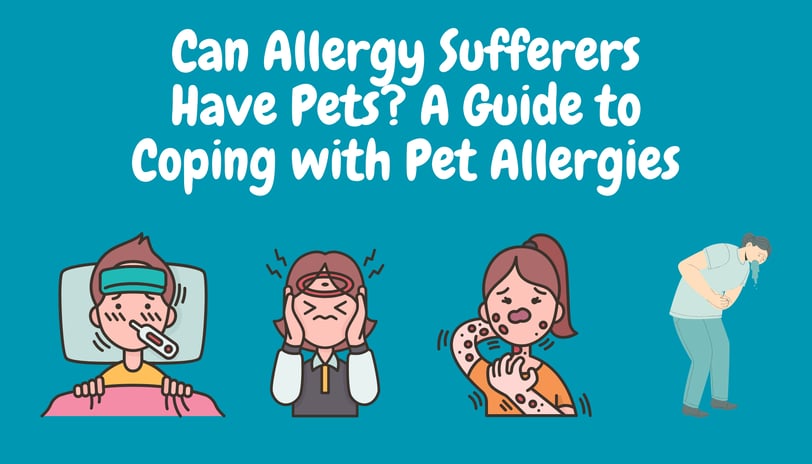Can Allergy Sufferers Have Pets? A Guide to Coping with Pet Allergies
Our pet may be triggering our allergies, or we may want to get a pet but can't because of allergies, but can we cope with allergies and how?
PET'S HEALTY


Can Allergy Sufferers Have Pets? A Guide to Coping with Pet Allergies
Dreaming of a furry friend but your allergies are holding you back? It's a tough spot! Pet allergies are super common. They can really affect anyone wanting a pet. The good news? You don't always have to pick between your health and a pet's love.
Let's look at ways people with allergies can still enjoy having pets. We'll talk about types of pets, how to handle allergies, and what to do before bringing an animal home. So, is it possible to own a pet with allergies? It can be! With some planning, you can find a way to live happily with a pet despite allergies.
Basic Information on Pet Allergies
What exactly causes those sniffles and sneezes around pets? It's more than just fur. Also, there are some big misunderstandings about "allergy-free" pets. Let's clear up some things about pet allergies.
What Causes Allergies?
Most pet allergies aren't about the fur itself. The real troublemakers are pet dander (dead skin flakes), saliva, and even urine. These things have proteins that set off your allergies. When pets groom themselves, they spread saliva on their fur. As dander sheds, these allergens float into the air. This can cause reactions for sensitive people.
The Most Common Pet Allergens
Cats are often big allergy triggers. A protein called Fel d 1, found in cat saliva, is a major culprit. Dogs also produce allergens, though the specific proteins vary between breeds. Even small pets like rabbits and guinea pigs can cause allergies because of their dander and urine.
Misconceptions about Pet Allergies
"Hypoallergenic" doesn't mean "allergy-free." No dog or cat breed is totally allergen-free. Some breeds, like poodles, produce less dander. This might cause fewer allergy issues. But, everyone reacts differently, so there is no sure thing.
Allergy Friendly Pet Options: Fact or Myth?
Okay, so there's no truly allergy-free pet. But, some animals are less likely to cause reactions. Let's explore these options. Are they fact or fiction?
Hypolargenic Dog Breeds: Myths and Facts
Poodles, Portuguese Water Dogs, and Schnauzers often get called "hypoallergenic." The truth is they shed less. This means less dander floats around your house. But, they still produce allergens. So, while they might be better for some people, they aren't a guaranteed solution for everyone with allergies.
Hypolargenic Cat Breeds: Available Options
Siberian and Balinese cats produce less of the Fel d 1 protein. Some allergy sufferers find they can handle these breeds better. But like dogs, no cat is 100% hypoallergenic. Spending time with a cat before adopting is a good idea. This way, you can see how your allergies react.
Other Allergy Friendly Pets
Maybe dogs and cats aren't a good fit for your allergies. Don't worry! Other pets can be great choices. Fish are allergen-free and relaxing to watch. Reptiles like lizards and turtles don't produce dander. Small mammals like hamsters can work if their cages are cleaned often and kept away from bedrooms.
Pet Adoption Strategies for Allergy Sufferers
Okay, you're thinking of getting a pet. What can you do to keep those allergies in check? Lots of things! Let's go over tips for managing allergens in your home.
Tips for Reducing Allergens at Home
Air purifiers with HEPA filters can catch allergens floating in the air. Regular cleaning is also key. Vacuum often, wash bedding, and dust surfaces. It also helps to make some areas "pet-free zones," like your bedroom.
How Pet Care Helps Manage Allergies
Grooming your pet regularly can lower the amount of dander they spread. Bathing your pet can help too, though not too often, as it can dry out their skin. Cleaning litter boxes and cages often also keeps allergens down.
Medication and Allergy Vaccines
Over-the-counter antihistamines and nasal sprays can ease allergy symptoms. Your doctor might also suggest prescription meds. Allergy shots (immunotherapy) can help your body get used to the allergens over time.
What to do before meeting a new pet ?
Don't bring a pet home on a whim! Plan ahead. Here's what to do before you commit.
Allergy Testing
See an allergist. Get tested to find out exactly what you're allergic to. This helps you make the right choice of pet.
Trial with a Pet
If possible, spend time with the pet you're thinking about adopting. See how your allergies react. Many shelters and breeders let you do this.
Consulting a Veterinarian and Allergist
Talk to your doctor about your allergies. Also, chat with a vet about the pet's needs. They can give you advice on how to manage allergies and keep both you and your pet healthy.
Psychological and Emotional Benefits of Pet Adoption with Allergies
Even with allergies, pets can make your life better. They give you love and company. It's important to think about the good things they bring.
The Positive Effects of Pets on Mental Health
Pets can lower stress, ease anxiety, and fight loneliness. They give you a reason to get up in the morning. They're always happy to see you!
Improving Quality of Life while Managing Allergies
It's about finding a balance. Manage your allergies. Enjoy the love of your pet. It might take some work. The rewards are often worth it.
Conclusion
So, can you own a pet if you have allergies? Yes, often you can! Know what causes your allergies. Choose pets wisely. Manage your symptoms. With planning, you can enjoy the amazing bond with an animal.
Talk to your doctor and think about adopting a pet that matches your lifestyle and allergies. With the right approach, you and a furry, scaly, or finned friend can share a happy life together. Remember, responsible pet ownership and good allergy management is the key.


